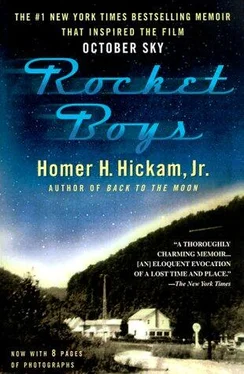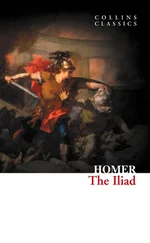For a satisfying noise, nothing beat going up on the Coalwood School bridge and throwing pop bottles into the empty coal cars rolling in to the tipple. When the coal cars were full and stopped beneath the bridge, some of the braver boys would even leap into them, plunging waist-deep into the loose coal. I tried it once and barely escaped when the train suddenly pulled out, bound for Ohio. I wallowed through the coal and climbed down the outside ladder of the car and jumped for it, skinning my hands, knees, and elbows on the packed coal around the track. My mother took no pity on me and scrubbed the coal dirt off me with a stiff brush and Lava soap. My skin felt raw for a week.
When I wasn’t outside playing, I spent hours happily reading. I loved to read, probably the result of the unique education I received from the Coalwood School teachers known as the “Great Six,” a corruption of the phrase “grades one through six.” For years, these same six teachers had seen through their classrooms generations of Coalwood students. Although Mr. Likens, the Coalwood School principal, controlled the junior high school with a firm hand, the Great Six held sway in the grades below. It seemed to be very important to these teachers that I read. By the second grade, I was intimately familiar with and capable of discussing in some detail Tom Sawyer and Uncle Tom’s Cabin. Huckleberry Finn they saved for me until the third grade, tantalizingly holding it back as if it contained the very secrets of life. When I was finally allowed to read it, I very well knew this was no simple tale of rafting down a river but the everlasting story of America itself, with all our glory and shame.
Bookcases filled with complete sets of Tom Swift, The Bobbsey Twins, The Hardy Boys , and Nancy Drew were in the grade-school hallway and available to any student for the asking. I devoured them, savoring the adventures they brought to me. When I was in the fourth grade, I started going upstairs to the junior high school library to check out the Black Stallion series. There, I also discovered Jules Verne. I fell in love with his books, filled as they were with not only great adventures but scientists and engineers who considered the acquisition of knowledge to be the greatest pursuit of mankind. When I finished all the Verne books in the library, I became the first in line for any book that arrived written by modern science-fiction writers such as Heinlein, Asimov, van Vogt, Clarke, and Bradbury. I liked them all unless they branched out into fantasy. I didn’t care to read about heroes who could read minds or walk through walls or do magic. The heroes I liked had courage and knew more real stuff than those who opposed them. When the Great Six inspected my library record and found it top-heavy with adventure and science fiction, they prescribed appropriate doses of Steinbeck, Faulkner, and F. Scott Fitzgerald. It seemed as if all through grade school, I was reading two books, one for me and one for my teachers.
For all the knowledge and pleasure they gave me, the books I read in childhood did not allow me to see myself past Coalwood. Almost all the grown-up Coalwood boys I knew had either joined the military services or gone to work in the mine. I had no idea what the future held in store for me. The only thing I knew for sure was my mother did not see me going into the mine. One time after Dad tossed her his check, I heard her tell him, “Whatever you make, Homer, it isn’t enough.”
He replied, “It keeps a roof over your head.”
She looked at the check and then folded it and put it in her apron pocket. “If you’d stop working in that hole,” she said, “I’d live under a tree.”
After Mr. Carter sold out, the company was renamed Olga Coal Company. Mom always called it “Miss Olga.” If anybody asked her where Dad was, she’d say, “With Miss Olga.” She made it sound as if it was his mistress.
Mom’s family did not share her aversion to coal mining. All of her four brothers—Robert, Ken, Charlie, and Joe—were miners, and her sister, Mary, was the wife of a miner. Despite their father’s hideous accident, my father’s two brothers were also miners; Clarence worked in the Caretta mine across the mountain from Coalwood, and Emmett in mines around the county. Dad’s sister, Bennie, married a Coalwood miner and they lived down across the creek, near the big machine shops. But the fact that all of her family, and my father’s family, were miners did not impress my mother. She had her own opinion, formed perhaps by her independent nature or by her ability to see things as they really were, not as others, including herself, would wish them to be.
In the morning before she began her ritual battle against the dust, my mother could nearly always be found with a cup of coffee at the kitchen table in front of an unfinished mural of a seashore. She had been working on the painting ever since Dad took over the mine and we moved into the Captain’s house. By the fall of 1957, she had painted in the sand and shells and much of the sky and a couple of seagulls. There was an indication of a palm tree going up too. It was as if she was painting herself another reality. From her seat at the table, she could reflect on her roses and bird feeders through the picture window the company carpenters had installed for her. Per her specifications, it was angled so not a hint of the mine could be seen.
I knew, even as a child, that my mother was different from just about everybody in Coalwood. When I was around three years old, we were visiting Poppy in his little house up Warriormine Hollow, and he took me on his lap. That scared me, because he didn’t have a lap, just an empty wrinkled blanket where his legs should have been. I struggled in his thick arms while Mom hovered nervously nearby. “He’s just like Homer,” I remember toothless Poppy lisping to Mom while I squirmed. He called to my dad on the other side of the room. “Homer, he’s just like you!”
Mom anxiously took me from Poppy and I clutched hard to her shoulder, my heart beating wildly from an unidentified terror. She carried me out onto the front porch, stroking my hair and hushing me. “No, you’re not,” she crooned just loud enough so only she and I could hear. “No, you’re not.”
Dad slapped open the screen door and came out on the porch as if to argue with her. Mom turned away from him and I saw his eyes, usually a bright hard blue, soften into liquid blots. I snuggled my face into her neck while Mom continued to rock and hold me, still singing her quietly insistent song: No, you’re not. No, you’re not . All through my growing-up years, she kept singing it, one way or the other. It was only when I was in high school and began to build my rockets that I finally understood why.
IWAS ELEVEN years old when the Captain retired and my father took his position. The Captain’s house, a big, barnlike wood-frame structure, and the closest house in Coalwood to the tipple, became our house. I liked the move because for the first time I didn’t have to share a room with Jim, who never made any pretense of liking me or wanting me around. From my earliest memory, it was clear my brother blamed me for the tension that always seemed to exist between our parents. There may have been a kernel of truth to his charge. The story I heard from Mom was that Dad wanted a daughter, and when I came along he was so clearly disappointed, and said so in such certain terms, she retaliated by naming me after him: Homer Hadley Hickam, Junior . Whether that incident caused all their other arguments that followed, I couldn’t say. All I knew was that their discontent had left me with a heavy name. Fortunately, Mom started calling me “Sunny” right away because, she said, I was a happy child. So did everybody else, although my first-grade teacher changed the spelling to the more masculine “Sonny.”
Читать дальше
Конец ознакомительного отрывка
Купить книгу












